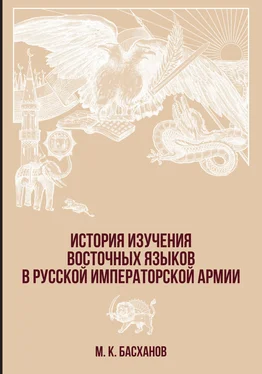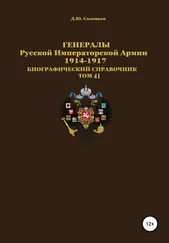3) Знакомство с соробуном в мере, достаточной для чтения и перевода печатных писем простейшего содержания.
4) Умение написать самостоятельно небольшую записку простого содержания, пользуясь словарями и пособиями.
Китайский язык
1) Разговор с образованным китайцем на более сложные темы общего и военного содержания (кроме узко специальных).
2) Перевод письменно и устно с китайского на русский язык статей (кроме узко специальных) из газет, а также военных уставов и документов военного содержания, при пользовании словарями и пособиями.
3) Умение составить, пользуясь словарями и пособиями, небольшую записку простого содержания.
Монгольский язык
1) Умение вести свободно разговор с монголом-халхасцем на общие и военные темы.
2) Умение переводить деловые бумаги и частные письма.
3) Умение разбирать рукописи употребительных в Монголии почерков.
4) Умение переводить с русского и составлять на литературном языке записки и иные бумаги на общие и военные темы.
Желательно некоторое практическое знакомство, кроме основного халхаского наречия, еще с каким-либо другим монгольским наречием.
Корейский язык
1) Разговор с образованным корейцем на более сложные темы общего и военного содержания (кроме узко специальных).
2) Перевод письменно и устно с корейского на русский язык статей (кроме узко специальных) из какой-либо распространенной газеты, а также из документов военного или общего содержания, пользуясь словарями и пособиями.
3) Умение написать самостоятельно небольшую записку простого содержания, пользуясь словарями и пособиями.
Языки персидский, турецкий, афганский и сартовский
1) Умение свободно и правильно передать содержание любой газетной статьи (кроме узко специальных) и содержание несложного текста книги военного содержания.
2) Умение перевести с русского языка на данный восточный язык тексты из общей части газеты или выдержки из книг нетрудного содержания.
3) Приобретение навыка в чтении официальной и частной переписки, написанной употребительными для этой переписки почерками, и в переводе несложных официальных бумаг военного, политического и общего содержания.
4) Умение составить и написать письмо, с соблюдением формы письменных сношений, по вопросам военного и общего характера.
5) Знание общеупотребительной военной терминологии на данном языке.
6) Умение вести свободно устную беседу на данном языке на обыкновенные темы общего и военного содержания.
Ист.: РГВИА. Ф. 400. Оп. 1. Д. 4273. Л. 34–37 об.
A History of the Study of Eastern Languages in the Russian Imperial Army
The Russian Empire occupied a vast territory in Asia and shared an extensive land and sea border with eastern states stretching from the Ottoman Empire to Japan. The Russian Imperial Army was instrumental in ensuring the defence of the eastern borders of the Empire, the administrative management of the border areas and in ensuring Russia's foreign policy in the East. In order to prepare the Army and Navy for the conduct of the war in the East, the Russian General Staff paid considerable attention to the study of adjacent countries of the East and their armed forces. From the middle of the 19th century the theory and practice of “military statistics” (application of statistical analysis to military geography) had been developed in Russia, which in many ways contributed to the development of military-geographical and statistical studies of the countries of the East. The establishment of the military district system in Russia, on the eastern outskirts of the Empire, the deployment of military districts was accomplished, assuming the functions of military-administrative control of the borderlands and military planning and preparation of the troops for the war in the East. To implement military policy in Asia, the Russian Imperial Army required trained specialists familiar with Asian countries and armies, as well as with Eastern languages.
In the second half of the 19th century the system of training military orientologists with the knowledge of Oriental languages was established in Russia. The basis of this system were specialized military and civilian educational institutions, in which military orientologists and translators were trained. This system of personnel training had undergone continuous evolution, which was interrupted by the outbreak of the First World War. Training of officers with knowledge of Eastern languages was practiced at the time in the armies of the world mostly the British, French, German, and Japanese armies, but in no country had such a large-scale, multilevel and diversified system of training military orientologists been created, as it was in Russia.
The training of military specialists with knowledge of Eastern languages in the Russian Imperial Army was exercised on two major levels – academic and practical. Specialists with an academic military orientology education were trained in St. Petersburg at the Officers’ Courses in Eastern languages at the Asiatic Department of the Ministry of Foreign Affairs (languages of the Middle East) and in Vladivostok at the Officers’ Department of the Eastern Institute (languages of the Far East). The training of officers with practical knowledge of Eastern languages for the needs of the Asian military districts and combat troops was carried out at different time in Orenburg, Omsk, Novocherkassk and Tashkent. After the military orientolоgy reform in the Russian Imperial Army (1905–1911) – in Tashkent, Tiflis and Vladivostok. In addition to the specialized orientology educational institutions, military interpreters were trained in a variety of courses at the headquarters of the Asian military districts, separate detachments and at the Kulja and Urga translation schools.
More than 300 specialists were trained over the bicentennial history of training of military orientologists and translators in the Russian Imperial Army. The curricula of specialized military orientology educational institutions included the study of a total of 15 Eastern languages – Arabic, Persian, Turkish, Pashto, Chinese, Japanese, Korean, Mongolian, Tibetan, etc. Many graduates of military orientology educational institutions made an important contribution to the study of the countries of the East and the development of orientology science in Russia.
Читать дальше
Конец ознакомительного отрывка
Купить книгу












